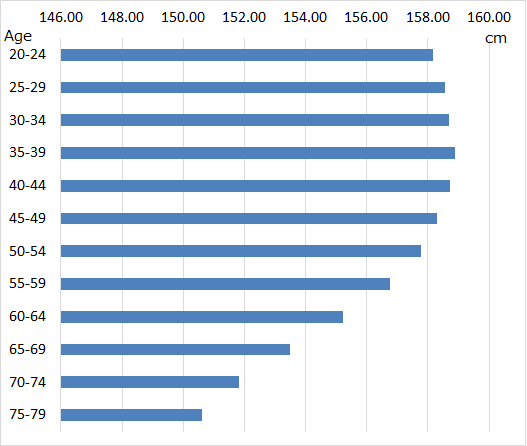Average Height of Japanese Female

The average height of a Japanese female is a topic of interest, given the country’s unique genetic and environmental factors that influence physical characteristics. According to data from the Japanese Ministry of Health, Labour and Welfare, the average height for an adult Japanese woman is approximately 158.8 cm (5 feet 2.4 inches) as of 2020. This makes Japanese women among the tallest in East Asia, yet still somewhat shorter than the average heights of women in many Western countries.
Several factors contribute to the average height of Japanese females, including genetics, nutrition, and lifestyle. Historically, the Japanese diet has been rich in nutrients that support growth, such as fish and soy, which are high in protein and other essential nutrients. However, the traditional Japanese diet has also been relatively low in dairy products, which are a significant source of calcium and vitamins crucial for bone development and height.
In recent decades, there has been a noticeable increase in the average height of Japanese females, largely attributed to improvements in nutrition and healthcare. The incorporation of more Western-style foods, including dairy products and beef, into the Japanese diet, along with increased access to healthcare services, has contributed to this trend. Moreover, public health campaigns and educational programs aimed at promoting healthy eating habits and lifestyles have also played a role in enhancing overall growth and development among children and adolescents.
Despite these advances, regional variations exist within Japan, with individuals from certain prefectures or backgrounds potentially having different average heights due to genetic, dietary, and socioeconomic factors. Urban versus rural differences also come into play, as access to nutritional food and healthcare services can vary significantly between these settings.
It’s also worth noting that height can be influenced by a multitude of factors beyond genetics and nutrition, including lifestyle choices, exposure to pollutants, and socioeconomic status. In Japan, as in many countries, there is a correlation between height and socioeconomic status, suggesting that environmental factors play a crucial role in determining adult height.
For those interested in how Japanese women’s average height compares internationally, it’s useful to look at global statistics. According to data from various sources, including the World Health Organization (WHO), the average height for adult women worldwide is about 159 cm (5 feet 2.5 inches), with significant variations across different regions and countries. European countries, such as the Netherlands, Denmark, and Latvia, tend to have some of the tallest populations, with average female heights ranging from 170 cm to over 172 cm (5 feet 7 inches to 5 feet 8 inches).
In conclusion, the average height of Japanese females reflects a complex interplay of genetic, dietary, and environmental factors. While there has been an increase in average height over recent decades, Japan’s female population remains somewhat shorter than many Western populations. Ongoing research into the determinants of height and the implementation of public health strategies aimed at optimizing growth and development will continue to shed light on this fascinating aspect of human biology.
Height and Lifestyle
- Dietary Habits: A balanced diet rich in proteins, vitamins, and minerals, especially during childhood and adolescence, is crucial for achieving maximum height potential. The Japanese diet, while nutritious, has traditionally been low in certain nutrients found in abundance in Western diets, such as vitamin D and calcium from dairy products.
- Physical Activity: Regular physical activity, particularly weight-bearing exercises, is important for bone health and density. Japan, known for its bustling cities and demanding work culture, sees a broad range of physical activity levels among its population, which can influence overall health and potentially height.
- Healthcare Access: Easy access to quality healthcare can significantly impact growth and development. Japan’s healthcare system is renowned for its quality and accessibility, contributing to a healthy population and, by extension, influencing factors such as average height.
Regional Variations
- Urban vs. Rural: Differences in lifestyle, diet, and access to healthcare between urban and rural areas can lead to variations in average height. Urban populations, often with better access to a diverse range of foods and healthcare services, might exhibit different growth patterns compared to their rural counterparts.
- Genetic Factors: Genetic background, which varies across different regions and families, plays a significant role in determining height. While Japan is ethnically relatively homogeneous, there are still genetic variations that can influence physical characteristics like height.
Global Comparison
- Average Heights Worldwide: When comparing the average height of Japanese females to that of women in other countries, it’s clear that there’s a wide range of heights globally. Factors such as nutrition, genetics, and overall health contribute to these differences, making height a fascinating indicator of both individual and population health.
Future Trends
- Nutritional Education: As awareness about nutrition and its impact on health and development grows, it’s likely that future generations will see further increases in average height, assuming access to balanced diets and healthcare continues to improve.
- Lifestyle Changes: Changes in lifestyle, including increased physical activity and reduced exposure to pollutants, can also contribute to healthier growth patterns and potentially influence average heights in the future.
FAQ
What is the current average height of a Japanese female?
+The current average height for an adult Japanese woman is approximately 158.8 cm (5 feet 2.4 inches) as of the last available data.
How does the average height of Japanese females compare internationally?
+Japanese women are among the taller in East Asia but generally shorter than women in many Western countries, with the global average height for adult women being about 159 cm (5 feet 2.5 inches).
What factors contribute to the average height of Japanese females?
+Factors such as genetics, nutrition, lifestyle, and access to healthcare contribute to the average height of Japanese females. Improvements in these areas have led to an increase in average height over recent decades.
